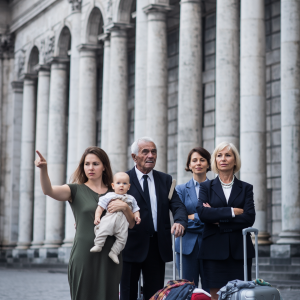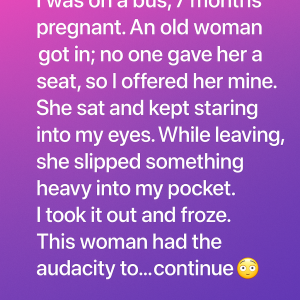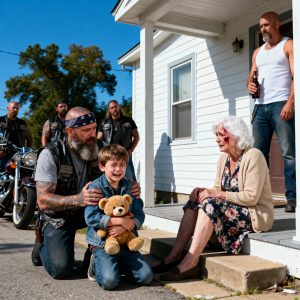The Juneteenth festival was in full swing—music pulsing through the streets, the smell of barbecue and funnel cakes in the air, kids darting between food trucks, laughter spilling from every corner.
I’d only looked away for a heartbeat to pay for a funnel cake, but when I turned back, my nephew Zavi was gone.
A surge of panic hit me like ice water. I dropped everything and started calling his name, scanning bounce houses, weaving through the crowd, my voice shaking with fear.
I was seconds from dialing 911 when I spotted him—fast asleep, curled up in the arms of a police officer standing quietly off to the side.
The officer looked completely at ease, as though this was just another part of his day. When I ran over, breathless, he simply nodded and explained that Zavi had wandered off near the snow cone truck, gotten tired, and dozed off. “Didn’t want to leave him alone,” he said gently.
I thanked him, scooped Zavi back into my arms, and tried to brush off the embarrassment and relief. That’s when I noticed the stares.
Phones out. People murmuring. Some smiles, some frowns. And then I caught one woman near the food stand mutter, “Must be nice to get that kind of response.”
It took me a moment to understand.
They weren’t talking about Zavi’s nap.
They were talking about the fact that a young Black boy was in a police officer’s arms—and how differently things might have gone if the scene had played out any other way.
That thought lodged itself deep in my chest.
Would he still be safe if he hadn’t looked so small, so harmless, so tired?
That night, I kept replaying the moment in my mind. Officer Davies—that was his name—had been calm, kind, and reassuring. He returned Zavi with a smile and a brief explanation, nothing more.
But the whispers in the crowd suggested another possible story, one shaped by the complicated weight of race and perception.
What if Zavi had been older? Taller? What if he had been standing there awake, fidgeting, or looking scared instead of peaceful?
Would the interaction have been the same?
The next day, I talked to my sister—Zavi’s mom. She’d noticed the stares too. And we both knew the truth: the color of Zavi’s skin had influenced how people saw that moment.
We decided to share what happened—not to stir outrage, but to start a conversation.
We posted on social media, praising Officer Davies for his kindness while also acknowledging the uncomfortable undercurrent we’d felt in that crowd.
The post exploded. Some called us oversensitive. Others shared similar stories—moments where race had changed the entire tone of an interaction with law enforcement.
Then, in the middle of the hundreds of comments, one stood out. It was from Officer Davies himself.
He thanked us for our words and admitted he understood the concern. “It’s a reminder,” he wrote, “that there’s still work to be done.”
A week later, the local police department reached out. They wanted to use our experience as a training opportunity—an open discussion about implicit bias and community relations.
We agreed.
Speaking at the town hall was nerve-wracking. We told our story—our fear when Zavi disappeared, our relief when he was found, and our awareness that the moment could have looked very different.
Officer Davies was there too. He spoke about his role in the community, the history that shapes public trust, and his desire to be part of positive change.
It wasn’t an easy conversation. There were tense moments, disagreements, and truths that sat heavy in the air. But there was also listening—real listening—and a willingness to see one another as people first.
From there, small changes began to grow. Davies helped launch youth outreach events, bringing kids and officers together in everyday, positive spaces. My sister and I kept sharing our story, encouraging similar conversations in other communities.
Zavi, still too young to understand the weight of that day, remained his joyful, curious self. But one day, we’ll tell him. We’ll tell him about the kindness he received, and also about the whispers—about the deeper lesson that day carried.
Because even moments of fear can plant seeds for understanding. And sometimes, the biggest change begins with a single conversation—sparked by something as simple as a child falling asleep in a stranger’s arms.





